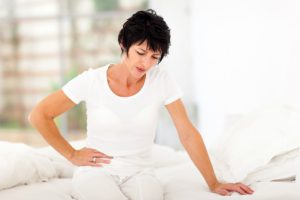Natural options for period pain – Ask the Naturopath
 Lots of women experience physical discomfort around the time of their period. It’s hard to put a percentage on it, but in my clinic I would say at least 60% of women experience some degree of discomfort with menstruation. Most women think it is normal to experience pain with their period and resort to strong pain killers every month.
Lots of women experience physical discomfort around the time of their period. It’s hard to put a percentage on it, but in my clinic I would say at least 60% of women experience some degree of discomfort with menstruation. Most women think it is normal to experience pain with their period and resort to strong pain killers every month.
There are various effective natural medicines available that can help reduce the pain and need for pharmaceuticals such as naprogesic each month. This article aims to outline when and how a naturopath can help.
Firstly why do we get period pain?
There are 2 types of period pain (Dysmenorrhoea) –
- Primary ( or functional ) dysmenorrhoea is where the uterine muscle behaves abnormally ( ie muscle contractions are too strong, the muscle fails to relax adequately and blood flow thru the muscle is compromised causing pain). Primary dysmenorrhoea is usually caused by an imbalance in prostaglandins (hormone like substances) and otherwise the tissue itself is normal and healthy.
- Secondary dysmenorrhoea is where there is an underlying condition such as endometriosis, adenomyosis, PCOS or pelvic inflammatory disease where the tissue is affected resulting in inflammation and pain.
What are the naturopathic treatment options available for period pain ?
From a naturopathic point of view, treatment should focus on identifying and eliminating the underlying cause of the pain rather than just offering a “band aid” solution such as a pain killer every month. The naturopathic philosophy to treating period pain aims to support the person as whole. In addition to supporting healthy hormone balance I always consider other factors such as diet, health of the body’s elimination pathways (such as digestion, kidney and liver function), nervous system and stress response when formulating a treatment plan.
A typical naturopathic treatment plan to reduce period pain is likely to involve some or all of the following –
Herbal medicine formulation. This is most commonly prescribed in a liquid extract form but can also be prescribed as a tablet or tea. Herbal medicines are selected on a case by case basis depending on patient. Common herbal medicine actions include –
- Anti spasmodics to help relax excessive muscle spasm.
- Uterine tonics to help initiate regular, more rhythmic uterine muscle contractions.
- Warming herbs to support blood flow to the area.
- Hormone regulating herbs that can have a regulating affect on prostaglandins.
- Nervine or relaxing herbs that support the nervous system and are useful for those patients where anxiety or tension accompanies the pain.
- Analgesic herbs.
Nutritional medicine such as –
- Essential fatty acids – such as fish oils or evening primrose oil which exert anti inflammatory action and affect prostaglandin levels.
- Calcium and magnesium – which support healthy muscle contraction and relaxation.
- B vitamins to support neuromuscular function.
Specific dietary support such as –
- Anti inflammatory diet to help reduce levels of prostaglandins associated with muscle spasm. This may involve food sensitivity testing to help identify offending foods that may be contributing to the inflammatory picture of the patient.
Lifestyle suggestions such as –
- Pelvic exercises, relaxation techniques, hot water bottle or heat pack, essential oil massage, yoga and regular exercise.
- Track menstrual symptoms using a chart or I PHONE app to help you and the naturopath monitor change and help better predict and manage symptoms more effectively.
If the pain is severe, changes in any way or if there is excessive menstrual blood loss or the pain accompanied by other symptoms such as vomiting, diarrhoea, dizziness you should consult their GP first for an accurate diagnosis.
The underlying message is that period pain should not be the norm and there are naturopathic options available to help reduce the need for pain killer medication every month. Don’t try and self prescribe natural medicines. No two patients are ever the same and many natural medicines are contra indicated in certain cases and can interfere with the action pharmaceutical drugs. So, it is always recommended patients seek professional advice from a qualified Naturopath when using any natural medicine.
Previous Post Next Post